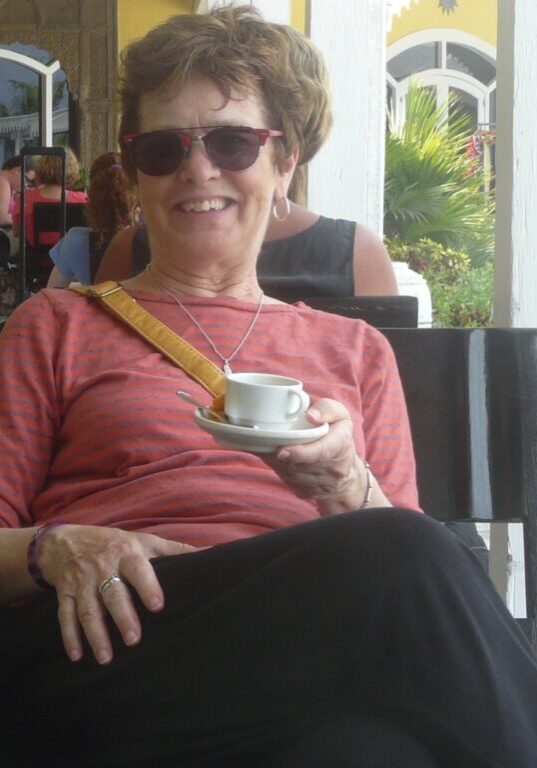The only thing that remains of a long forgotten tree fallen into rushing waters,
the part that refuses to let the river grind it into nothingness.
“What’s this long scar under my chin from?” I ask my red-headed Aunt Shirley, my mother’s only surviving sister. I ask casually, and she with a whish of her hand through the air says, “Oh, that’s from the car accident you were in with your father. You were a toddler in the front seat. I think you guys were stationed at Fort Bragg.”
I have no memory.
I notice another scar further up my jaw—this as my skin ages and thins, and what’s been there all along comes forth finally. Another scar sits between my eyes just over the bridge of my nose. It’s a small indent, could be a chickenpox scar or one from the accident. When I rub my finger over it, it fills in ever so slightly like braille I can’t read.
“You went through the windshield,” Aunt Shirley continues so matter of factly.
There must have been blood. Maybe an ambulance. Did we make a trip to Womack Army Hospital where my third sister would be born by the time my mother was twenty-one? Maybe some army doctor used stitches to sew things together as I screamed. Maybe the emergency unit told my father I would forget this by morning. “Kids don’t remember these things,” he might have said.
When I am middle age, a psychologist tells me such incidents get stuck in our cells like narratives difficult to let go. They take up space and can be heard when we are willing to listen. The mind, she tells me, is eager to forget, but the body cannot. So why has it taken this long to find the scars? Have I known about these knots of memory all along as I squirm in the passenger’s seat to this day, imagining in my mind’s eye sudden accidents? There is no proof. Only conjecture.
Aunt Shirley tells me it was just me and my father in that car. “He was drinking,” she says as if she just remembered. My mother might have been hanging diapers on the base community clothesline, her sandaled feet in the red sand of the Piedmont. Or maybe she was sitting on the stoop with coffee and other military wives waiting for the mail or a baby to fall asleep. Maybe soldiers marched by with their rucksacks and helmets, calling out repeated refrains in unison. Or maybe there was a radio in an opened window of our coal-dusted apartment on Smoke Bomb Hill playing Eddie Fisher’s "Wish You Were Here" or the Four Aces’s "Tell Me Why."
Then there is a crash somewhere before we get home. “He had been drinking,” Aunt Shirley repeats. Surely there was a police scene, and both of us sent to the hospital. But what I want to know is why we never spoke of this accident through the long years of more siblings, and wars at home and abroad. Was there silence because my father had his own scars to deal with like the World War II shrapnel buried in his legs, or his thighs carved from a training accident when all the soldiers in front of him were killed with a misfired bazooka? Then there were the hidden scars from war, maybe the ones that drove him to drink and wild car rides. Drove him to fights in bars and a riotous spin in a cardboard box down an Olympic ski slope at midnight. More importantly, maybe his threats to kill himself in our apartment living room were from those scars, his loaded pistol finally laid down on the dining room table as he walked away.
The dictionary calls a scar a sore that has not healed and the fibrous connective tissue that follows. It’s the lasting effect of grief or fear left by a traumatic experience. A mark following damage. A blemish, a lesion, a disturbance. Let’s imagine the car windows down on a warm summer day, the two of us in my father’s black Mercury, all shiny and clean like he wanted. Let’s remember there were no seat belts because laws were different then. And let’s say my father swooped me up from the couch because I was crying, and tossed me, barefooted in t-shirt and diaper, into the front seat next to him, promising me a ride. Maybe ice cream. Imagine me standing up with one arm on the back of the seat. Me trusting all was well in the world. Maybe I’m smiling and so glad to have his attention.
***
Who was my father, the man who insisted I go to college before I even knew what a college was, read me poetry and made sure his life insurance would pay for my future schooling? The same man who drank far too much without heed of his young daughter? The man who dropped out of high school for the military? Who was my mother within this domestic cost of war? These questions and more remain like a river’s tooth sculptured under water as the past decomposes and what stays behind are these solid whorls of memory collecting in pools, which is to say our bodies eventually rising to the true narratives of our lives. And I, the one who survived that accident, must carry all of this with me. Now that I know about the scars, I keep seeing those marks every time I look in the mirror. I draw my fingers across my chin and neck. I pause and wonder.

